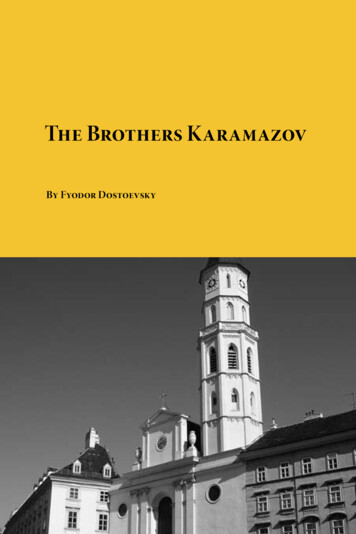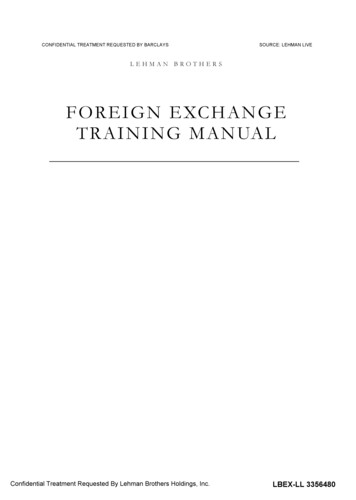
Transcription
The Brothers KaramazovBy Fyodor DostoevskyDownload free eBooks of classic literature, books andnovels at Planet eBook. Subscribe to our free eBooks blogand email newsletter.
PART IBook IThe History of a Family The Brothers Karamazov
Chapter 1Fyodor PavlovitchKaramazovALEXEY Fyodorovitch Karamazov was the third son ofFyodor Pavlovitch Karamazov, a landowner well knownin our district in his own day, and still remembered amongus owing to his gloomy and tragic death, which happenedthirteen years ago, and which I shall describe in its properplace. For the present I will only say that this ‘landowner’— for so we used to call him, although he hardly spent a dayof his life on his own estate — was a strange type, yet onepretty frequently to be met with, a type abject and viciousand at the same time senseless. But he was one of thosesenseless persons who are very well capable of looking aftertheir worldly affairs, and, apparently, after nothing else. Fyodor Pavlovitch, for instance, began with next to nothing;his estate was of the smallest; he ran to dine at other men’stables, and fastened on them as a toady, yet at his death itappeared that he had a hundred thousand roubles in hardcash. At the same time, he was all his life one of the mostsenseless, fantastical fellows in the whole district. I repeat, itFree eBooks at Planet eBook.com
was not stupidity — the majority of these fantastical fellowsare shrewd and intelligent enough — but just senselessness,and a peculiar national form of it.He was married twice, and had three sons, the eldest,Dmitri, by his first wife, and two, Ivan and Alexey, by hissecond. Fyodor Pavlovitch’s first wife, Adelaida Ivanovna,belonged to a fairly rich and distinguished noble family,also landowners in our district, the Miusovs. How it cameto pass that an heiress, who was also a beauty, and moreover one of those vigorous intelligent girls, so common inthis generation, but sometimes also to be found in the last,could have married such a worthless, puny weakling, as weall called him, I won’t attempt to explain. I knew a younglady of the last ‘romantic’ generation who after some yearsof an enigmatic passion for a gentleman, whom she mightquite easily have married at any moment, invented insuperable obstacles to their union, and ended by throwing herselfone stormy night into a rather deep and rapid river from ahigh bank, almost a precipice, and so perished, entirely tosatisfy her own caprice, and to be like Shakespeare’s Ophelia. Indeed, if this precipice, a chosen and favourite spot ofhers, had been less picturesque, if there had been a prosaicflat bank in its place, most likely the suicide would neverhave taken place. This is a fact, and probably there havebeen not a few similar instances in the last two or threegenerations. Adelaida Ivanovna Miusov’s action was similarly, no doubt, an echo of other people’s ideas, and wasdue to the irritation caused by lack of mental freedom. Shewanted, perhaps, to show her feminine independence, to The Brothers Karamazov
override class distinctions and the despotism of her family.And a pliable imagination persuaded her, we must suppose,for a brief moment, that Fyodor Pavlovitch, in spite of hisparasitic position, was one of the bold and ironical spiritsof that progressive epoch, though he was, in fact, an ill-natured buffoon and nothing more. What gave the marriagepiquancy was that it was preceded by an elopement, andthis greatly captivated Adelaida Ivanovna’s fancy. FyodorPavlovitch’s position at the time made him specially eagerfor any such enterprise, for he was passionately anxious tomake a career in one way or another. To attach himself to agood family and obtain a dowry was an alluring prospect.As for mutual love it did not exist apparently, either in thebride or in him, in spite of Adelaida Ivanovna’s beauty. Thiswas, perhaps, a unique case of the kind in the life of FyodorPavlovitch, who was always of a voluptuous temper, andready to run after any petticoat on the slightest encouragement. She seems to have been the only woman who madeno particular appeal to his senses.Immediatley after the elopement Adelaida Ivanovna discerned in a flash that she had no feeling for her husbandbut contempt. The marriage accordingly showed itself inits true colours with extraordinary rapidity. Although thefamily accepted the event pretty quickly and apportionedthe runaway bride her dowry, the husband and wife beganto lead a most disorderly life, and there were everlasting scenes between them. It was said that the young wifeshowed incomparably more generosity and dignity thanFyodor Pavlovitch, who, as is now known, got hold of allFree eBooks at Planet eBook.com
her money up to twenty five thousand roubles as soon asshe received it, so that those thousands were lost to her forever. The little village and the rather fine town house whichformed part of her dowry he did his utmost for a long timeto transfer to his name, by means of some deed of conveyance. He would probably have succeeded, merely from hermoral fatigue and desire to get rid of him, and from thecontempt and loathing he aroused by his persistent andshameless importunity. But, fortunately, Adelaida Ivanovna’s family intervened and circumvented his greediness. Itis known for a fact that frequent fights took place betweenthe husband and wife, but rumour had it that Fyodor Pavlovitch did not beat his wife but was beaten by her, for shewas a hot-tempered, bold, dark-browed, impatient woman,possessed of remarkable physical strength. Finally, she leftthe house and ran away from Fyodor Pavlovitch with a destitute divinity student, leaving Mitya, a child of three yearsold, in her husband’s hands. Immediately Fyodor Pavlovitchintroduced a regular harem into the house, and abandonedhimself to orgies of drunkenness. In the intervals he usedto drive all over the province, complaining tearfully to eachand all of Adelaida Ivanovna’s having left him, going intodetails too disgraceful for a husband to mention in regardto his own married life. What seemed to gratify him andflatter his self-love most was to play the ridiculous part ofthe injured husband, and to parade his woes with embellishments.‘One would think that you’d got a promotion, FyodorPavlovitch, you seem so pleased in spite of your sorrow,’ The Brothers Karamazov
scoffers said to him. Many even added that he was glad of anew comic part in which to play the buffoon, and that it wassimply to make it funnier that he pretended to be unawareof his ludicrous position. But, who knows, it may have beensimplicity. At last he succeeded in getting on the track ofhis runaway wife. The poor woman turned out to be in Petersburg, where she had gone with her divinity student, andwhere she had thrown herself into a life of complete emancipation. Fyodor Pavlovitch at once began bustling about,making preparations to go to Petersburg, with what objecthe could not himself have said. He would perhaps have really gone; but having determined to do so he felt at onceentitled to fortify himself for the journey by another boutof reckless drinking. And just at that time his wife’s familyreceived the news of her death in Petersburg. She had diedquite suddenly in a garret, according to one story, of typhus,or as another version had it, of starvation. Fyodor Pavlovitch was drunk when he heard of his wife’s death, and thestory is that he ran out into the street and began shoutingwith joy, raising his hands to Heaven: ‘Lord, now lettestThou Thy servant depart in peace,’ but others say he weptwithout restraint like a little child, so much so that peoplewere sorry for him, in spite of the repulsion he inspired. Itis quite possible that both versions were true, that he rejoiced at his release, and at the same time wept for her whoreleased him. As a general rule, people, even the wicked,are much more naive and simple-hearted than we suppose.And we ourselves are, too.Free eBooks at Planet eBook.com
Chapter 2He Gets Rid of HisEldest SonYOU can easily imagine what a father such a man could beand how he would bring up his children. His behaviouras a father was exactly what might be expected. He completely abandoned the child of his marriage with AdelaidaIvanovna, not from malice, nor because of his matrimonialgrievances, but simply because he forgot him. While he waswearying everyone with his tears and complaints, and turning his house into a sink of debauchery, a faithful servant ofthe family, Grigory, took the three-year old Mitya into hiscare. If he hadn’t looked after him there would have been noone even to change the baby’s little shirt.It happened moreover that the child’s relations on hismother’s side forgot him too at first. His grandfather was nolonger living, his widow, Mitya’s grandmother, had movedto Moscow, and was seriously ill, while his daughters weremarried, so that Mitya remained for almost a whole yearin old Grigory’s charge and lived with him in the servant’scottage. But if his father had remembered him (he could The Brothers Karamazov
not, indeed, have been altogether unaware of his existence)he would have sent him back to the cottage, as the childwould only have been in the way of his debaucheries. Buta cousin of Mitya’s mother, Pyotr Alexandrovitch Miusov,happened to return from Paris. He lived for many years afterwards abroad, but was at that time quite a young .man,and distinguished among the Miusovs as a man of enlightened ideas and of European culture, who had been in thecapitals and abroad. Towards the end of his life he became aLiberal of the type common in the forties and fifties. In thecourse of his career he had come into contact with manyof the most Liberal men of his epoch, both in Russia andabroad. He had known Proudhon and Bakunin personally,and in his declining years was very fond of describing thethree days of the Paris Revolution of February, 1848, hinting that he himself had almost taken part in the fighting onthe barricades. This was one of the most grateful recollections of his youth. He had an independent property of abouta thousand souls, to reckon in the old style. His splendidestate lay on the outskirts of our little town and borderedon the lands of our famous monastery, with which PyotrAlexandrovitch began an endless lawsuit, almost as soon ashe came into the estate, concerning the rights of fishing inthe river or wood-cutting in the forest, I don’t know exactlywhich. He regarded it as his duty as a citizen and a manof culture to open an attack upon the ‘clericals.’ Hearingall about Adelaida Ivanovna, whom he, of course, remembered, and in whom he had at one time been interested, andlearning of the existence of Mitya, he intervened, in spiteFree eBooks at Planet eBook.com
of all his youthful indignation and contempt for FyodorPavlovitch. He made the latter’s acquaintance for the firsttime, and told him directly that he wished to undertakethe child’s education. He used long afterwards to tell as acharacteristic touch, that when he began to speak of Mitya,Fyodor Pavlovitch looked for some time as though he didnot understand what child he was talking about, and evenas though he was surprised to hear that he had a little son inthe house. The story may have been exaggerated, yet it musthave been something like the truth.Fyodor Pavlovitch was all his life fond of acting, of suddenly playing an unexpected part, sometimes without anymotive for doing so, and even to his own direct disadvantage, as, for instance, in the present case. This habit, however,is characteristic of a very great number of people, some ofthem very clever ones, not like Fyodor Pavlovitch. Pyotr Alexandrovitch carried the business through vigorously, andwas appointed, with Fyodor Pavlovitch, joint guardian ofthe child, who had a small property, a house and land, lefthim by his mother. Mitya did, in fact, pass into this cousin’skeeping, but as the latter had no family of his own, and aftersecuring the revenues of his estates was in haste to returnat once to Paris, he left the boy in charge of one of his cousins, a lady living in Moscow. It came to pass that, settlingpermanently in Paris he, too, forgot the child, especiallywhen the Revolution of February broke out, making an impression on his mind that he remembered all the rest of hislife. The Moscow lady died, and Mitya passed into the careof one of her married daughters. I believe he changed his10The Brothers Karamazov
home a fourth time later on. I won’t enlarge upon that now,as I shall have much to tell later of Fyodor Pavlovitch’s firstborn, and must confine myself now to the most essentialfacts about him, without which I could not begin my story.In the first place, this Mitya, or rather Dmitri Fyodorovitch, was the only one of Fyodor Pavlovitch’s three sonswho grew up in the belief that he had property, and that hewould be independent on coming of age. He spent an irregular boyhood and youth. He did not finish his studies at thegymnasium, he got into a military school, then went to theCaucasus, was promoted, fought a duel, and was degradedto the ranks, earned promotion again, led a wild life, andspent a good deal of money. He did not begin to receive anyincome from Fyodor Pavlovitch until he came of age, anduntil then got into debt. He saw and knew his father, FyodorPavlovitch, for the first time on coming of age, when he visited our neighbourhood on purpose to settle with him abouthis property. He seems not to have liked his father. He didnot stay long with him, and made haste to get away, havingonly succeeded in obtaining a sum of money, and enteringinto an agreement for future payments from the estate, ofthe revenues and value of which he was unable (a fact worthy of note), upon this occasion, to get a statement from hisfather. Fyodor Pavlovitch remarked for the first time then(this, too, should be noted) that Mitya had a vague and exaggerated idea of his property. Fyodor Pavlovitch was verywell satisfied with this, as it fell in with his own designs.He gathered only that the young man was frivolous, unruly, of violent passions, impatient, and dissipated, and thatFree eBooks at Planet eBook.com11
if he could only obtain ready money he would be satisfied,although only, of course, a short time. So Fyodor Pavlovitch began to take advantage of this fact, sending him fromtime to time small doles, instalments. In the end, when fouryears later, Mitya, losing patience, came a second time toour little town to settle up once for all with his father, itturned out to his amazement that he had nothing, that itwas difficult to get an account even, that he had receivedthe whole value of his property in sums of money from Fyodor Pavlovitch, and was perhaps even in debt to him, thatby various agreements into which he had, of his own desire,entered at various previous dates, he had no right to expectanything more, and so on, and so on. The young man wasoverwhelmed, suspected deceit and cheating, and was almost beside himself. And, indeed, this circumstance led tothe catastrophe, the account of which forms the subject ofmy first introductory story, or rather the external side of it.But before I pass to that story I must say a little of FyodorPavlovitch’s other two sons, and of their origin.12The Brothers Karamazov
Chapter 3The Second Marriageand the Second FamilyVERY shortly after getting his four-year-old Mitya off hishands Fyodor Pavlovitch married a second time. Hissecond marriage lasted eight years. He took this secondwife, Sofya Ivanovna, also a very young girl, from anotherprovince, where he had gone upon some small piece of business in company with a Jew. Though Fyodor Pavlovitch wasa drunkard and a vicious debauchee he never neglected investing his capital, and managed his business affairs verysuccessfully, though, no doubt, not over-scrupulously. Sofya Ivanovna was the daughter of an obscure deacon, andwas left from childhood an orphan without relations. Shegrew up in the house of a general’s widow, a wealthy oldlady of good position, who was at once her benefactress andtormentor. I do not know the details, but I have only heardthat the orphan girl, a meek and gentle creature, was oncecut down from a halter in which she was hanging from anail in the loft, so terrible were her sufferings from the caprice and everlasting nagging of this old woman, who wasFree eBooks at Planet eBook.com13
apparently not bad-hearted but had become an insufferabletyrant through idleness.Fyodor Pavlovitch made her an offer; inquiries weremade about him and he was refused. But again, as in hisfirst marriage, he proposed an elopement to the orphan girl.There is very little doubt that she would not on any accounthave married him if she had known a little more about himin time. But she lived in another province; besides, whatcould a little girl of sixteen know about it, except that shewould be better at the bottom of the river than remainingwith her benefactress. So the poor child exchanged a benefactress for a benefactor. Fyodor Pavlovitch did not get apenny this time, for the general’s widow was furious. Shegave them nothing and cursed them both. But he had notreckoned on a dowry; what allured him was the remarkablebeauty of the innocent girl, above all her innocent appearance, which had a peculiar attraction for a vicious profligate,who had hitherto admired only the coarser types of feminine beauty.‘Those innocent eyes slit my soul up like a razor,’ he usedto say afterwards, with his loathsome snigger. In a man sodepraved this might, of course, mean no more than sensual attraction. As he had received no dowry with his wife,and had, so to speak, taken her ‘from the halter,’ he didnot stand on ceremony with her. Making her feel that shehad ‘wronged’ him, he took advantage of her phenomenalmeekness and submissiveness to trample on the elementary decencies of marriage. He gathered loose women intohis house, and carried on orgies of debauchery in his wife’s14The Brothers Karamazov
presence. To show what a pass things had come to, I maymention that Grigory, the gloomy, stupid, obstinate, argumentative servant, who had always hated his first mistress,Adelaida Ivanovna, took the side of his new mistress. Hechampioned her cause, abusing Fyodor Pavlovitch in amanner little befitting a servant, and on one occasion brokeup the revels and drove all the disorderly women out ofthe house. In the end this unhappy young woman, kept interror from her childhood, fell into that kind of nervousdisease which is most frequently found in peasant womenwho are said to be ‘possessed by devils.’ At times after terrible fits of hysterics she even lost her reason. Yet she boreFyodor Pavlovitch two sons, Ivan and Alexey, the eldest inthe first year of marriage and the second three years later. When she died, little Alexey was in his fourth year, and,strange as it seems, I know that he remembered his mother all his life, like a dream, of course. At her death almostexactly the same thing happened to the two little boys asto their elder brother, Mitya. They were completely forgotten and abandoned by their father. They were looked afterby the same Grigory and lived in his cottage, where theywere found by the tyrannical old lady who had brought uptheir mother. She was still alive, and had not, all those eightyears, forgotten the insult done her. All that time she wasobtaining exact information as to her Sofya’s manner of life,and hearing of her illness and hideous surroundings shedeclared aloud two or three times to her retainers:‘It serves her right. God has punished her for her ingratitude.’Free eBooks at Planet eBook.com15
Exactly three months after Sofya Ivanovna’s death thegeneral’s widow suddenly appeared in our town, and wentstraight to Fyodor Pavlovitch’s house. She spent only halfan hour in the town but she did a great deal. It was evening. Fyodor Pavlovitch, whom she had not seen for thoseeight years, came in to her drunk. The story is that instantlyupon seeing him, without any sort of explanation, she gavehim two good, resounding slaps on the face, seized him by atuft of hair, and shook him three times up and down. Then,without a word, she went straight to the cottage to the twoboys. Seeing, at the first glance, that they were unwashedand in dirty linen, she promptly gave Grigory, too, a box onthe ear, and announcing that she would carry off both thechildren she wrapped them just as they were in a rug, putthem in the carriage, and drove off to her own town. Grigoryaccepted the blow like a devoted slave, without a word, andwhen he escorted the old lady to her carriage he made her alow bow and pronounced impressively that, ‘God would repay her for orphans.’ ‘You are a blockhead all the same,’ theold lady shouted to him as she drove away.Fyodor Pavlovitch, thinking it over, decided that it was agood thing, and did not refuse the general’s widow his formal consent to any proposition in regard to his children’seducation. As for the slaps she had given him, he drove allover the town telling the story.It happened that the old lady died soon after this, but sheleft the boys in her will a thousand roubles each ‘for their instruction, and so that all be spent on them exclusively, withthe condition that it be so portioned out as to last till they16The Brothers Karamazov
are twenty-one, for it is more than adequate provision forsuch children. If other people think fit to throw away theirmoney, let them.’ I have not read the will myself, but I heardthere was something queer of the sort, very whimsically expressed. The principal heir, Yefim Petrovitch Polenov, theMarshal of Nobility of the province, turned out, however,to be an honest man. Writing to Fyodor Pavlovitch, anddiscerning at once that he could extract nothing from himfor his children’s education (though the latter never directly refused but only procrastinated as he always did in suchcases, and was, indeed, at times effusively sentimental), Yefim Petrovitch took a personal interest in the orphans. Hebecame especially fond of the younger, Alexey, who livedfor a long while as one of his family. I beg the reader to notethis from the beginning. And to Yefim Petrovitch, a man ofa generosity and humanity rarely to be met with, the youngpeople were more indebted for their education and bringing up than to anyone. He kept the two thousand roublesleft to them by the general’s widow intact, so that by thetime they came of age their portions had been doubled bythe accumulation of interest. He educated them both at hisown expense, and certainly spent far more than a thousandroubles upon each of them. I won’t enter into a detailed account of their boyhood and youth, but will only mention afew of the most important events. Of the elder, Ivan, I willonly say that he grew into a somewhat morose and reserved,though far from timid boy. At ten years old he had realisedthat they were living not in their own home but on otherpeople’s charity, and that their father was a man of whomFree eBooks at Planet eBook.com17
it was disgraceful to speak. This boy began very early, almost in his infancy (so they say at least), to show a brilliantand unusual aptitude for learning. I don’t know precisely why, but he left the family of Yefim Petrovitch when hewas hardly thirteen, entering a Moscow gymnasium andboarding with an experienced and celebrated teacher, anold friend of Yefim Petrovitch. Ivan used to declare afterwards that this was all due to the ‘ardour for good works’ ofYefim Petrovitch, who was captivated by the idea that theboy’s genius should be trained by a teacher of genius. Butneither Yefim Petrovitch nor this teacher was living whenthe young man finished at the gymnasium and entered theuniversity. As Yefim Petrovitch had made no provision forthe payment of the tyrannical old lady’s legacy, which hadgrown from one thousand to two, it was delayed, owing toformalities inevitable in Russia, and the young man was ingreat straits for the first two years at the university, as hewas forced to keep himself all the time he was studying. Itmust be noted that he did not even attempt to communicate with his father, perhaps from pride, from contempt forhim, or perhaps from his cool common sense, which toldhim that from such a father he would get no real assistance.However that may have been, the young man was by nomeans despondent and succeeded in getting work, at firstgiving sixpenny lessons and afterwards getting paragraphson street incidents into the newspapers under the signatureof ‘Eye-Witness.’ These paragraphs, it was said, were so interesting and piquant that they were soon taken. This aloneshowed the young man’s practical and intellectual superi18The Brothers Karamazov
ority over the masses of needy and unfortunate students ofboth sexes who hang about the offices of the newspapersand journals, unable to think of anything better than everlasting entreaties for copying and translations from theFrench. Having once got into touch with the editors IvanFyodorovitch always kept up his connection with them, andin his latter years at the university he published brilliantreviews of books upon various special subjects, so that hebecame well known in literary circles. But only in his lastyear he suddenly succeeded in attracting the attention of afar wider circle of readers, so that a great many people noticed and remembered him. It was rather a curious incident.When he had just left the university and was preparing to goabroad upon his two thousand roubles, Ivan Fyodorovitchpublished in one of the more important journals a strangearticle, which attracted general notice, on a subject of whichhe might have been supposed to know nothing, as he was astudent of natural science. The article dealt with a subjectwhich was being debated everywhere at the time — the position of the ecclesiastical courts. After discussing severalopinions on the subject he went on to explain his own view.What was most striking about the article was its tone, andits unexpected conclusion. Many of the Church party regarded him unquestioningly as on their side. And yet notonly the secularists but even atheists joined them in theirapplause. Finally some sagacious persons opined that thearticle was nothing but an impudent satirical burlesque. Imention this incident particularly because this article penetrated into the famous monastery in our neighbourhood,Free eBooks at Planet eBook.com19
where the inmates, being particularly interested in questionof the ecclesiastical courts, were completely bewildered byit. Learning the author’s name, they were interested in hisbeing a native of the town and the son of ‘that Fyodor Pavlovitch.’ And just then it was that the author himself madehis appearance among us.Why Ivan Fyodorovitch had come amongst us I remember asking myself at the time with a certain uneasiness.This fateful visit, which was the first step leading to so manyconsequences, I never fully explained to myself. It seemedstrange on the face of it that a young man so learned, soproud, and apparently so cautious, should suddenly visit such an infamous house and a father who had ignoredhim all his life, hardly knew him, never thought of him, andwould not under any circumstances have given him money,though he was always afraid that his sons Ivan and Alexeywould also come to ask him for it. And here the young manwas staying in the house of such a father, had been livingwith him for two months, and they were on the best possible terms. This last fact was a special cause of wonder tomany others as well as to me. Pyotr Alexandrovitch Miusov,of whom we have spoken already, the cousin of Fyodor Pavlovitch’s first wife, happened to be in the neighbourhoodagain on a visit to his estate. He had come from Paris, whichwas his permanent home. I remember that he was more surprised than anyone when he made the acquaintance of theyoung man, who interested him extremely, and with whomhe sometimes argued and not without inner pang compared himself in acquirements.20The Brothers Karamazov
‘He is proud,’ he used to say, ‘he will never be in want ofpence; he has got money enough to go abroad now. Whatdoes he want here? Everyone can see that he hasn’t come formoney, for his father would never give him any. He has notaste for drink and dissipation, and yet his father can’t dowithout him. They get on so well together!’That was the truth; the young man had an unmistakableinfluence over his father, who positively appeared to be behaving more decently and even seemed at times ready toobey his son, though often extremely and even spitefullyperverse.It was only later that we learned that Ivan had come partly at the request of, and in the interests of, his elder brother,Dmitri, whom he saw for the first time on this very visit,though he had before leaving Moscow been in correspondence with him about an important matter of more concernto Dmitri than himself. What that business was the readerwill learn fully in due time. Yet even when I did know ofthis special circumstance I still felt Ivan Fyodorovitch tobe an enigmatic figure, and thought his visit rather mysterious.I may add that Ivan appeared at the time in the light ofa mediator between his father and his elder brother Dmitri,who was in open quarrel with his father and even planningto bring an action against him.The family, I repeat, was now united for the first time,and some of its members met for the first time in theirlives. The younger brother, Alexey, had been a year alreadyamong us, having been the first of the three to arrive. It isFree eBooks at Planet eBook.com21
of that brother Alexey I find it most difficult to speak in thisintroduction. Yet I must give some preliminary account ofhim, if only to explain one queer fact, which is that I haveto introduce my hero to the reader wearing the cassock ofa novice. Yes, he had been for the last year in our monastery, and seemed willing to be cloiste
Free eBooks at Planet eBook.com Chapter 1 Fyodor Pavlovitch Karamazov A LEXEY Fyodorovitch Karamazov was the third son of Fyodor Pavlovitch Karamazov, a landowner well known in our district in his own day, and still remembered among us owing to his gloomy and tragic death, which happened thi










